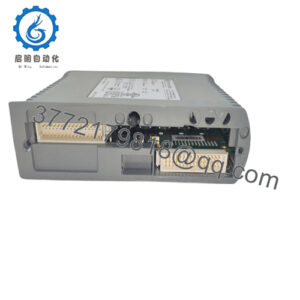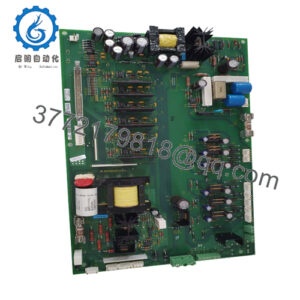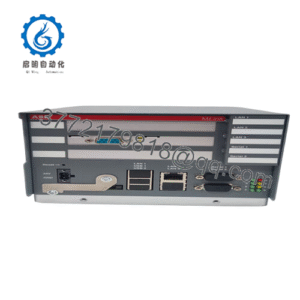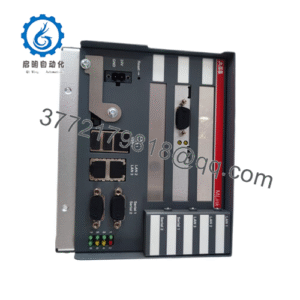Description
| Model Number | PFTL101A-2.0KN 3BSE004172R1 |
| Brand | ABB |
| Type | Precision Force Transducer |
| Measurement Range | 0–2.0 kN |
| Output Signal | 4–20 mA |
| Operating Temp Range | -30°C to 80°C |
| Mounting Style | Threaded Connection |
| Dimensions | 85 mm x 45 mm x 30 mm |
| Weight | 320 g |
| Interface | Analog Output (4–20 mA) |
| Compliance | CE, UL, RoHS, ISO 9001 |
| Accuracy Class | 0.1% FS |
| Typical Power Draw | 0.5 W |
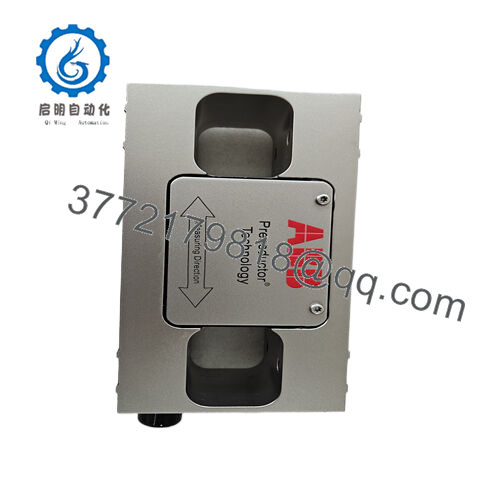
PFTL101A-2.0KN 3BSE004172R1
The ABB PFTL101A-2.0KN 3BSE004172R1 functions as a precision measurement device that converts mechanical force into electrical signals, enabling real-time monitoring and control of force-related processes. Positioned at the interface between mechanical systems and automation controls, it connects to force-applying components—such as cylinders, presses, or tension rollers—via its robust mounting hardware, while transmitting measurement data to ABB PLCs or drives through standard analog output signals. This integration ensures that force data flows seamlessly into the automation system, supporting closed-loop control strategies and quality monitoring.
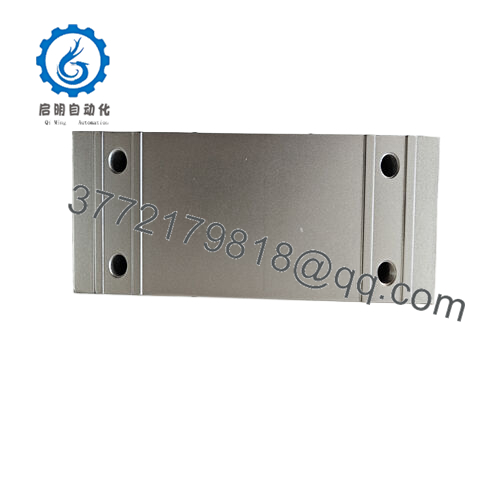
PFTL101A-2.0KN 3BSE004172R1
The ABB PFTL101A-2.0KN 3BSE004172R1 features strain gauge technology that delivers consistent accuracy across its 2.0 kN measurement range, with minimal hysteresis and linearity error. Its design includes built-in temperature compensation, ensuring stable performance even as environmental conditions fluctuate. The transducer communicates measurement status through integrated diagnostics, providing visibility into signal integrity and operational health for proactive maintenance.
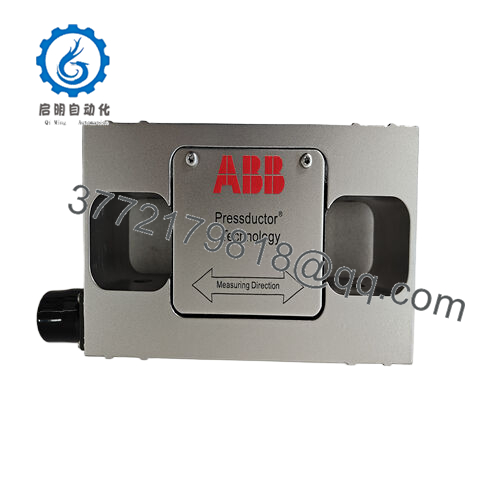
PFTL101A-2.0KN 3BSE004172R1
Main features and advantages:
Choosing the ABB PFTL101A-2.0KN 3BSE004172R1 delivers tangible benefits that enhance both process performance and operational efficiency. Its high accuracy—rated at 0.1% of full scale—ensures precise force control, which translates to consistent product quality in applications like component assembly, where uniform clamping force prevents damage or inadequate bonding. The transducer’s temperature compensation minimizes measurement drift in environments with fluctuating temperatures, reducing the need for frequent recalibration and ensuring long-term reliability.
The ABB PFTL101A-2.0KN 3BSE004172R1 simplifies integration with existing automation systems through its standard 4–20 mA output, eliminating the need for specialized interface hardware and reducing engineering overhead during setup. Its robust construction, including corrosion-resistant materials, ensures durability in demanding industrial environments, lowering replacement costs and extending service life. By providing reliable force data, the transducer enables data-driven process optimization, helping organizations reduce waste, improve energy efficiency, and enhance overall productivity in force-critical applications.
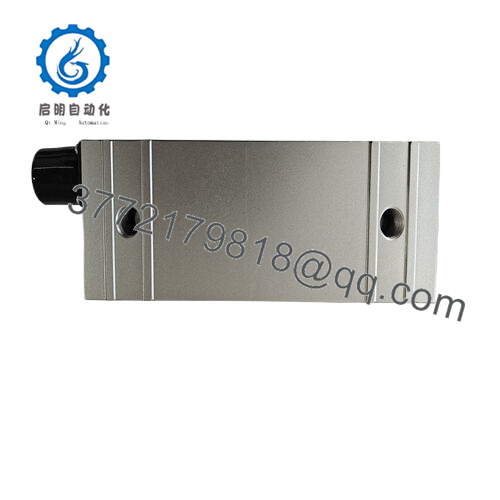
PFTL101A-2.0KN 3BSE004172R1
Application fields:
The ABB PFTL101A-2.0KN 3BSE004172R1 excels in applications where precise force measurement directly impacts quality and safety. In automotive manufacturing, it plays a critical role in assembly processes—monitoring clamping forces during component fastening to ensure proper torque without damaging parts, enhancing vehicle reliability and safety. Its ability to maintain accuracy across wide temperature ranges makes it ideal for use in paint shops or curing ovens where environmental conditions vary.
In packaging machinery, the ABB PFTL101A-2.0KN 3BSE004172R1 monitors sealing forces on packaging equipment, ensuring consistent seal integrity while preventing over-compression that could damage products. Material testing laboratories also rely on the transducer to measure tension and compression forces in material samples, providing accurate data for quality control and research purposes. In all these settings, the transducer’s reliability supports critical process control, ensuring consistent performance in 24/7 operations where measurement errors could lead to product defects or production delays.
Related products:
PFTL101A-1.0KN 3BSE004171R1 – Lower range (1.0 kN) version for lighter force applications.
PFTL101A-5.0KN 3BSE004173R1 – Higher capacity (5.0 kN) model for heavier force measurements.
PFTL201A-2.0KN – Compact force transducer with digital output for smart automation systems.
PFCL201 – Signal conditioning module optimized for use with PFTL101A series transducers.
ACS880-31 – ABB drive with force control capabilities compatible with PFTL101A-2.0KN.
CI854A – Communication interface for integrating force data into SCADA systems.
3BSE008507R1 – Calibration kit designed for PFTL101A series accuracy verification.
TU831V1 – Terminal unit for organized wiring of PFTL101A-2.0KN signal outputs.
Installation and maintenance:
Before installing the ABB PFTL101A-2.0KN 3BSE004172R1, verify that the application’s force range falls within the transducer’s 0–2.0 kN capacity, ensuring adequate headroom to prevent overload damage. Confirm compatibility with your signal conditioning equipment or PLC input cards, checking that they support 4–20 mA analog signals with sufficient resolution to utilize the transducer’s precision. Ensure the mounting surface is flat and rigid to prevent measurement inaccuracies from mechanical flexing. Inspect cabling for proper shielding to minimize electromagnetic interference, which can affect signal integrity in industrial environments.
For ongoing maintenance, perform quarterly visual inspections to check for physical damage or loose connections that could compromise measurement accuracy. Calibrate the transducer annually using ABB’s recommended procedures or certified calibration services to maintain compliance with quality standards. Keep the transducer clean and free from debris, particularly around the measurement element, as buildup can affect performance. Utilize system diagnostics to monitor signal stability, addressing any drift or noise issues promptly to prevent quality deviations in force-critical processes.
Other ABB product models:
ABB IDM-96
ABB IMCAM07B0000
ABB IMHSS03
ABB IMICV01
ABB IMRIO22
ABB INSUMMCU2
ABB IOR810
ABB IPFAN14
ABB IPMON01
ABB IPMON01
ABB IPS 21-35AD 3BHB017688R0001
ABB IPS21-24V-UL 3BHE032593R0001
ABB IPS21-35AD 3BHB017688R0001
ABB IPSYS01
ABB IRDH275-435
ABB IS200ERDDH1
ABB KPM-4LA41100102V1.2-KB2
ABB KSD211A101 3BHE024313R0101
ABB KSD211A101 3BHE024313R0101
ABB KSD211B 3BHE022455R1101
ABB KSD211B 3BHE022455R1101
ABB KUC711AE 3BHB004661R0001
ABB KUC711AE101 3BHB004661R0101
ABB LM80
ABB LM80.A
ABB LM80.SCP801-F810.LCD2.USBR.G800

 WhatsApp: +86 16626708626
WhatsApp: +86 16626708626 Email:
Email:  Phone: +86 16626708626
Phone: +86 16626708626